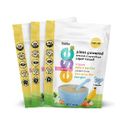Benefits of a Whole Food Diet for Kids
Discover the power of pure food. Whole foods nourish your child from the inside out, fueling their growth and development with essential nutrients
Published September 5, 2024

You've likely heard the term "whole foods" buzzing around. But what exactly does it mean, and is it good for your baby? Essentially, they're pure, unprocessed ingredients straight from nature. Think of a juicy apple freshly plucked from a tree or a spoonful of creamy, homemade lentil puree.
By choosing whole foods, you're providing essential vitamins and minerals and fostering a lifelong love for healthy eating.
» Choose plant-powered cereal when feeding your kid a whole-food diet
What Is a Whole-Food Diet?
Simply put, this diet revolves around foods in their natural or minimally processed state. They're packed with nutrients that work together to fuel your child's growing body and mind. For example:
- Complex Carbohydrates: They're rich in complex carbohydrates. These break down slowly in the gut and steadily release glucose into the bloodstream. This process helps prevent sudden spikes and crashes in energy levels, keeping your child energized throughout the day.
- Fiber: These foods are typically high in dietary fiber, which slows digestion and helps regulate blood sugar levels. As a result, your child has a more consistent energy supply without the rapid fluctuations that come from eating sugary or processed products.
- Vitamins and Minerals: Whole foods are packed with micronutrients essential for energy metabolism—such as B vitamins and iron.
- Healthy Fats: Avocados, nuts, and seeds in a whole-food diet contain healthy fats. These are a dense energy source that supports brain development and overall health.
- Protein: Protein is essential for growth and sustained energy levels. Opt for lean meats, fish, legumes, and dairy products.
- Hydration: Many whole foods, especially fruits and vegetables like watermelon and cucumber, have a high water content. Proper hydration is vital for maintaining energy levels and overall well-being.
» Read a pediatrician's review on nutritional and carb-rich diet for kids
The Best Whole Foods for Kids
For babies and toddlers, a diet of whole foods means plenty of:
- Fruits and Vegetables: Fresh, frozen, or dried fruits and veggies are full of vitamins and minerals essential for your child's growth and development.
- Whole Grains: Swap refined grains like white bread or rice with whole grains options. They're rich in fiber and vitamins that are crucial for your child's health.
- Legumes: Lentils, chickpeas, and beans are great protein and fiber sources. Puree them for smooth first bites or offer them as finger foods as your baby develops.
- Nuts and Seeds: When your kid is old enough, nuts and seeds are excellent sources of healthy fats and protein. Consider nut or seed butter on whole grain bread as a healthy snack for your little ones.
- Lean Proteins: Choose unprocessed options like fish, poultry, or eggs. Plant-based proteins like tofu are also suitable for little ones.
- Dairy: Opt for organic, unsweetened dairy products, which are rich in calcium and vitamin D.
- Healthy Fats: Avocados and olive oil are rich in monounsaturated fats, essential for building and protecting your child's brain.
A whole-food diet doesn't mean your child can never have a treat. It's about balance and making nutrient-rich ingredients the core of their meals.
» Explore whether your toddler can outgrow a milk allergy
Benefits of Whole Foods for Children
While whole foods nourish people of all ages, their impact on childhood health is particularly significant.
- Nutrient-Rich: They contain essential vitamins, minerals, and antioxidants crucial for your child's growth and development that processed foods often lack.
- Natural Energy Boost: Whole foods release energy slowly. This helps your child stay active and alert throughout the day without the energy crashes often associated with sugary or processed options.
- Promotes Healthy Growth: Eating whole foods provides better nutrition to support proper physical and cognitive development, ensuring your baby or toddler reaches its milestones.
- Balanced Blood Sugar Levels: Whole foods have fiber, healthy fats, and proteins, which regulate blood sugar levels and prevent sudden spikes and crashes.
- Supports Immune Health: The vitamins and minerals strengthen your child's immune system, helping them fight infections and illnesses more effectively.
- Establishes Healthy Eating Habits: Introducing these foods early on sets the foundation for lifelong healthy eating habits, making it easier for your child to make nutritious choices as they grow.
- Reduces the Risk of Obesity: Generally, whole foods are lower in empty calories and unhealthy fats, reducing the risk of childhood obesity and related health issues.
- Enhances Brain Development: Omega-3 fatty acids, found in fish, walnuts, and kidney beans, are essential for proper brain development and cognitive function.
- Supports Healthy Bones: Calcium and other nutrients from whole foods are essential for building strong bones and maintaining bone density, protecting your kid's skeletal system for years to come.
» Learn about the best nutritional supplement for kids with failure to thrive
Is Processed Food Bad for Your Child?
It's a common misconception that all processed foods are unhealthy. The truth is, there's a big difference between ultra-processed and minimally processed foods.
Ultra-Processed foods
These foods often contain high levels of added sugars, salt, unhealthy fats, and artificial ingredients to enhance taste, shelf life, and appearance. Examples include sugary cereals, heavily processed snacks, and many ready-to-eat meals.
These foods are typically low in essential nutrients and high in empty calories. Regularly eating these foods can cause unhealthy eating habits, which could lead to obesity and type 2 diabetes.
What to watch out for:
- Refined Grains: White flour, along with many other refined foods, has been processed to remove vital nutrients like fiber, leaving behind a less nutritious product.
- Added Sugars: Sweets, certain packaged foods, and sugary drinks that add empty calories.
- Artificial Ingredients: Watch out for artificial colors, flavors, and preservatives. Although the FDA considers these to be generally safe, the long-term effects are not fully understood, especially in children.
» Discover when to start finger food for babies
Minimally Processed Foods
These retain most of their natural nutritional value. These foods undergo minimal changes, like freezing, canning, or drying, to preserve or make them easier to eat. Examples include:
- Fresh or frozen fruits and vegetables
- Whole grain bread and pasta
- Plain yogurt and cheese
- Lean meats and poultry
- Canned beans, lentils, and tomatoes (without added salt or sugar)
» Explore whether plant-based formula is healthy for babies
How to Choose the Right Food for Your Kids
The goal is to prioritize nutritious whole foods while limiting highly processed options. By doing so, you'll be laying a solid foundation for your child's health and well-being, helping them develop healthy eating habits that can last a lifetime.
Here are some tips:
» Uncover the best nutrition tips for babies
Whole Foods vs. Supplements
Supplements can be tempting as a quick way to fill nutritional gaps, but they shouldn't replace a healthy diet. While they offer a concentrated boost of vitamins and minerals, they don't provide the same complete package of nutrients as whole foods.
Kids are still growing and developing, so their bodies are extra sensitive to what they eat and drink. Getting too much of one nutrient can be harmful, and it's easier to do that with supplements than with whole foods.
In addition, supplements have not been extensively studied in children, making their safety and efficacy uncertain. In contrast, whole foods have a long history of safe consumption and are supported by extensive research.
» Lean how to create a balanced diet for your children
Challenges and Solutions
While whole foods offer numerous benefits for babies and toddlers, incorporating them into a child's diet can present particular challenges:
Time Constraints: Preparing whole foods often requires more time than processing options. Busy parents may need help to balance meal preparation with other responsibilities.
Prepping meals in advance saves time and guarantees a variety of nutritious foods.
Financial Burden: Fresh, organic produce can be more expensive than processed alternatives, making it challenging to maintain a whole-food diet on a budget.
Opt for affordable whole-food options, buy seasonal produce, and consider frozen or canned alternatives.
Allergy Risks: Some whole foods, like nuts, shellfish, or certain fruits, can be allergens. While early introduction may reduce allergy risk, careful monitoring is essential.
Consult a pediatrician or registered dietitian for personalized advice on nutrient needs and dietary restrictions.
» Find out how to identify soy intolerance symptoms
Tips For Switching to Whole Foods
Changing from processed to whole foods can be challenging for young children. They're still developing their digestive systems and forming their taste preferences digestive systems. A sudden change can lead to stomach issues, food refusal, and nutritional imbalances.
Here are some tips for a successful switch:
- Start Slowly: Introduce new whole foods while offering familiar meals. Over time, increase the proportion of whole foods in your child's meals and snacks.
- Offer Variety: Provide fruits, vegetables, whole grains, lean proteins, and healthy fats. This will expose your child to different tastes and textures, making the transition more enjoyable.
- Monitor Reactions: Consider your child's responses to new foods. If you notice any allergies or intolerances, consult a pediatrician.
- Homemade Baby Food: Make homemade purees using whole fruits and vegetables for babies transitioning to solid foods. This lets you control the ingredients and gradually introduce new flavors.
- Be Patient and positive: Be patient and understanding during the transition. It may take time for your child to adjust to and develop a taste for the new foods.
- Lead by Example: Be a positive role model by enjoying whole foods yourself. Children often mimic their parents' eating habits.
» Explore strategies for transitioning from breastmilk to formula
Nourishing Your Baby From the Start
While whole foods are the foundation for a healthy diet, the demands of modern life often require practical choices. This is especially true when starting your baby on solid foods. Around six months, babies are ready to try purees, but preparing these from scratch with natural ingredients can be a real challenge.
That's where minimally processed Else Nutrition Baby Super Cereal shines. It's packed with essential nutrients and gentle on baby's tummy. Plus, it's super convenient! By mixing with breast milk or formula, you create a familiar taste with a new texture that babies love.
» Try minimally processed whole-food baby cereal
Disclaimer: The content and advice provided in this article are for informational purposes only and are not a substitute for medical diagnosis, treatment, or advice for specific medical conditions. Always consult a pediatrician to understand the needs of your child.











